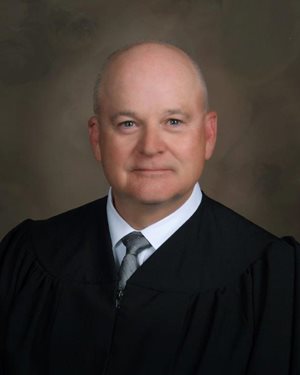 TOPEKA—Chief Judge Glenn Braun of the 23rd Judicial District has been appointed to sit with the Kansas Supreme Court to hear oral arguments in one case on the court's October 23 docket. After hearing oral arguments, Braun will join Supreme Court justices in their deliberations and decision drafting.
TOPEKA—Chief Judge Glenn Braun of the 23rd Judicial District has been appointed to sit with the Kansas Supreme Court to hear oral arguments in one case on the court's October 23 docket. After hearing oral arguments, Braun will join Supreme Court justices in their deliberations and decision drafting.
“I am pleased that Chief Judge Braun is taking time from his duties in the 23rd Judicial District to sit with the Supreme Court,” said Chief Justice Lawton Nuss. “It's a great help to our court, and we look forward to his contributions in deliberating and eventually deciding this case.”
Braun was appointed a district judge in 2012 and has been chief judge of the 23rd Judicial District since 2016. He presides over cases in Ellis, Rooks, Trego, and Gove counties.
“Having had the privilege of appearing before the Kansas Supreme Court as a practicing attorney, it is an honor to be extended the opportunity to sit as a judge with the court,” Braun said.
He is a graduate of Thomas More Prep-Marian High School in Hays, Kansas State University in 1978, and Washburn University School of Law in 1981. He was in private practice until 2012 and served as Ellis County Attorney from 1989 to 1997 and as a city of Hays prosecutor.
Braun served as president of the Kansas Bar Association in 2010-11 and as a commissioner of the Kansas Racing and Gaming Commission from 2005 to 2012. He was admitted to practice before the U.S. District Court and the U.S. Supreme Court.
All Supreme Court oral arguments are webcast live through the Watch Supreme Court Live! link in the right-hand column of the Kansas judicial branch website at www.kscourts.org.
The case Braun will hear is the first one scheduled on the court's 9 a.m. docket Tuesday, October 23. Braun sat with the court to hear this case when it first came before the court in May.
Appeal No. 115,036: State of Kansas v. Yamuna Rizal
Johnson County: (Petition for Review) Rizal is a convenience store co-owner convicted of possessing with intent to distribute K2—a controlled substance—near a school zone in violation of K.S.A. 5705(c)(1)(A), now K.S.A. 21-5705(d)(2) and (5). The district court sentenced Rizal to 36 months' probation in lieu of 49 months in prison but conditioned the sentence on serving 60 days in jail. The court considered in May 2018 whether McFadden v. U.S. applies to this case and whether the district court was required to find Rizal knew the synthetic cannabinoids she was selling were illegal. Also on review are whether: 1) McFadden v. U.S. applies in this case and requires the prosecution to introduce evidence the defendant actually knew the substance was illegal because it is listed as prohibited or knew the substance was a specific substance known by the defendant; and 2) there is sufficient evidence of Rizal's mental state to support a finding of guilt if McFadden is applied.